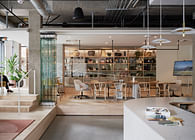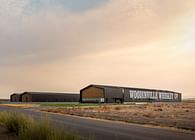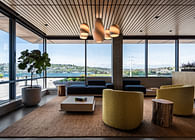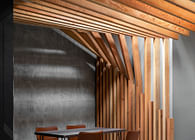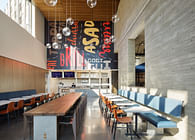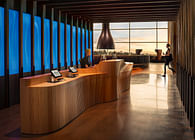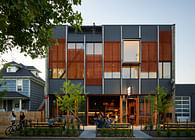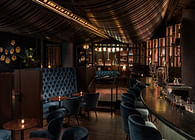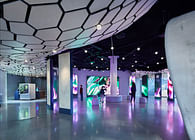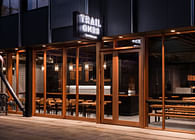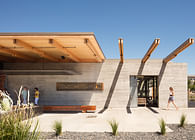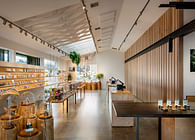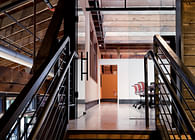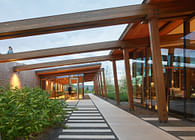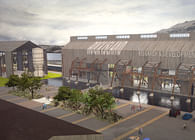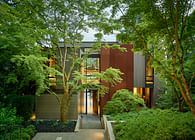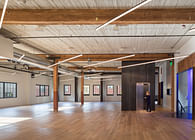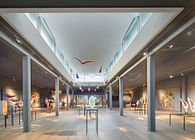
Seattle, WA
The 4,600-square-foot Hangar and 24,000-square-foot Town Square provide a year-round focal point and a symbolic living room for the city. Located in the heart of downtown, the complex touches upon the primal notions of gathering, creating a venue for passive and active recreation while ensuring a home for nature in the rapidly growing community. The Hanger, conceived as a pavilion, is designed to morph depending upon weather or functional requirements. Simple and large, the space opens to the Town Square via a 24-foot-wide by 16-foot-tall bi-fold window wall. When open, the large roof overhang provides protection from rain and sun, and enables parents easy access to their kids playing in the adjacent 14,000-square-foot plaza. The plaza features a fountain and heated rocks to encourage people to linger in inclement weather. The inverted roof lifts up from the building to gesture toward the park and adjacent thoroughfare, with the residual gap between building and roof becoming a dramatic clerestory. At night, the extensive glazing transforms the shelter into a lantern.
Inside, the structure includes a partitionable, multi-use assembly space for public gatherings, music performances, dance classes, movies, and more. Wood cabinetry lockers are integrated into the space to provide storage for community groups and activities such as yoga, club meetings, etc. The facility includes a see-through, double-sided fireplace and hearth composed of concrete, mild steel and milestone. The polished concrete floor is hydronically heated and, paired with the operable window walls and super-sized building fan, ensures a comfortable building environment throughout the year. Simple, durable low-maintenance materials include exposed plywood SIP panels, steel structural beams and columns, clear cedar siding, aluminum storefront windows, and a standing seam metal roof. Provisions for a cafe and a small bakery were incorporated into the design.
The Hangar at Kenmore Town Square meets the 2030 Challenge based on the Total Project Energy Use Index (EUI) for when the project was designed (2015), achieving a 79% reduction in CO2 emissions as compared to the average US building of the same type and size (the 2015 target for 2030 Challenge was a 70% reduction in CO2 emissions). In addition, the building envelope exceeds the 2012 Washington State Energy Code by 15%.
Status: Built
Location: Kenmore, WA, US
Firm Role: Architecture and Interior Design
Additional Credits: Graham Baba Architects project team
Jim Graham, design principal
Maureen O’Leary, senior project manager
Leann Crist, project manager and architect
Ross Eckert, architectural staff
Project team
Graham Baba Architects (architecture and interior design)
HEWITT Landscape Architects (prime consultant and landscape architect)
KPFF (civil engineer)
PAE Engineers (electrical)
Harriott Valentine Engineering (structural engineer)
Luma (lighting)
ARUP (acoustical design)




